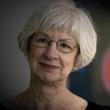With his infectious enthusiasm and sly wit, conductor Nicholas McGegan is a generally genial soul. But he has little patience for the notion that there ever was — or still is — a feud between musicians who perform 17th- and 18th-century music in the so-called authentic style on period instruments and those who don’t.
“I’m not sure where that might have come from,” said the British-born conductor, who will lead the Chicago Symphony Orchestra and Chorus, plus guest vocalists, in Handel’s Messiah on Dec. 16-19. Joining them will be soprano Yulia Van Doren, tenor Ben Bliss, bass-baritone Dashon Burton and countertenor Reginald Mobley.
Though McGegan now conducts a wide range of repertoire all over the world, he started his career 50 years ago as a Baroque flutist performing with ensembles headed by Christopher Hogwood, a dominant figure in the period-instrument movement. “I don’t know that the actual musicians who perform on period instruments have ever been that rigorous,” said McGegan, who’s now music director laureate of San Francisco’s Philharmonia Baroque Orchestra. “It makes good marketing for certain period instrument orchestras to pretend to be a little more holier than thou than they actually are.”
At any rate, while early music partisans may once have argued that large 21st-century orchestras can’t possibly do justice to Bach and Handel, who wrote for much smaller orchestras and less muscular instruments, McGegan insists that argument no longer resonates. “An awful lot of players in regular symphony orchestras have had a go at playing period instruments,” he said. “The younger ones have actually been exposed to all that [in music school]. It’s no longer sort of two warring camps — not that they really were; that was all a great invention.”
McGegan does credit the early-music movement with one great advance: resurrecting long-neglected works that deserve to be heard by contemporary audiences. “At least for recording and radio, the period instrument movement has brought an awful lot of repertoire into the mainstream,” he said. “The number of Vivaldi violin concertos you can hear now is incredibly large, whereas 20 years ago, you could maybe hear 10, of which four were The Seasons.”
But the modern orchestra has influenced early music ensembles for the better as well. “There’s a tremendous level of professionalism,” he said, which has rubbed off on their early music counterparts. As deeply researched Baroque performance practice began cross-pollinating between modern orchestras and period groups, the latter spruced up their acts a bit, according to McGegan. “The symphony is a thoroughly professional outfit,” he said. “So what you’ve got now, say, with my period instrument orchestra, is that we do run very professionally and we do wear tails. We have all the trappings of a modern symphony orchestra; we just happen to be playing period instruments. And what you get in the CSO is there they are, playing fantastic arias from Vivaldi operas. So everybody wins.”
Each of McGegan’s previous visits to Chicago has been marked by memorable events. In April 2011, he presided over concerts that paired the CSO with Hubbard Street Dance Chicago. On his first CSO engagement, in October 2005, he saw the city-wide celebrations and parade that greeted the White Sox after the team won its first World Series in 88 years. And in November 2008, his CSO visit coincided with the night that Barack Obama won his first presidency.
“I went to Grant Park with several other million people,” McGegan said. “That was the most glorious experience, to be with that crowd and just to be part of American history. I’m hoping for something very special,” he said of his upcoming visit to Chicago.
No ticker-tape parades or Election Night fireworks are on tap. But some other miracle might occur. Maybe the temperatures will stay above freezing. Now that would be something special, indeed.
A version of this article previously appeared on Sounds and Stories, the predecessor site of Experience CSO.


